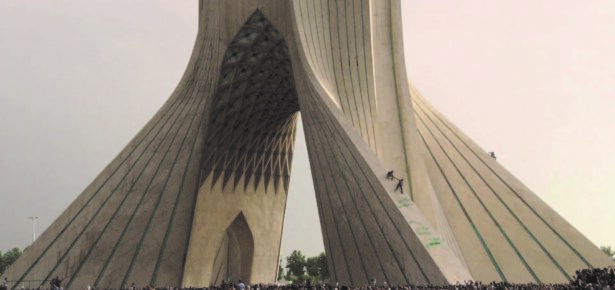
As the United States, Iran, and world powers inch closer to restoring the landmark 2015 Iran Nuclear Deal—formally known as the Joint Comprehensive Plan of Action (JCPOA)—issues like American interests, global security, and international diplomacy frequently take center stage. But what do Iranians themselves think about the deal and its trajectory in recent years?
To understand Iranian views, we can look at polling in the country throughout these years and how Iranians reacted in real time to the deal itself. Studies conducted by the University of Maryland show that a significant majority of Iranians see their nuclear program as an important national achievement, but do not support nuclear weapons. In 2015, as the deal was still being negotiated, a large majority supported it and were optimistic that a deal would happen.
That enthusiasm was apparent in the boisterous celebrations among Iranians who took to the streets in April of 2015 to express their delight at the announcement that Iran and the P5+1 had agreed to a general framework for the deal. Iranians celebrated again in July of that year when the agreement was officially announced, filled with hopes that Iran would no longer be isolated in the global community and Iranians would find economic relief from sanctions.
But more than polls and celebrations, how Iranians used the ballot box also exemplified a broad hope within Iranian society for a diplomatic breakthrough and a long-desired détente with the United States. While the Iranian political system is often described as a dual government—one elected group that includes a legislative body and executive administration and one unelected group that asserts greater control with the supreme leader sitting at the top—Iranians often exercise their agency by participating in, or boycotting, Iranian elections.
Following the controversial presidential election of 2009 and the brutal repression of the ensuing Green Movement, which called for accountability and major reform within the political system, Iranians took to the ballot again in 2013 to elect Hassan Rouhani, a moderate figure supported by the reformists who promised engagement with the West. In its first term, the Rouhani administration delivered its crowning achievement in the JCPOA. After the U.S. election of Donald Trump in 2016 and the new administration’s aggressive rhetoric against Iran and the deal, Iranians took the ballot box again in 2017 and overwhelmingly reelected Rouhani in an election that saw about 70% participation.
Despite worldwide support and Iranian enthusiasm for the deal, the Trump administration reneged on the agreement in May of 2018 and reimposed devastating sanctions on Iran. Even as the world faced the COVID-19 crisis, the Trump administration ignored international calls to ease sanctions in light of the pandemic. It is no surprise then, that positive Iranian attitudes towards the JCPOA and the United States waned under Trump’s “maximum pressure” policy.
Many Iranians closely followed the 2020 U.S. presidential election, which brought renewed hope with the defeat of President Trump and the election of Joe Biden who had served as Vice President of the Obama administration during the promising period of the 2015 deal. Although Iranians did not share the same enthusiasm from that time and believed the U.S. was responsible for taking the first steps to restore the agreement, polling early in the Biden administration showed that a majority of Iranians—and Americans—still supported the deal.
The fact that the Biden administration was slow to address the JCPOA in its first days in office, essentially maintained Trump’s policies—such as the FTO designation of Iran’s Islamic Revolutionary Guard Corps (IRGC)—and kept sanctions in place has also impacted Iranian views of the deal. In the most recent polling from August 2022, there is less hope that the United States will actually fulfill its end of the bargain but, at the same time, a majority of Iranians still believe restoring the deal would be better for their economy. It is noteworthy that a majority of Americans polled around the same time also support the deal and overwhelmingly prefer diplomacy over war.
As the evidence here suggests, Iranians have gone through a significant change in attitudes about the nuclear deal, the United States, and engagement with the West throughout these turbulent years. However, those changes have been predicated in large part to the actions of the United States. It is not wholly unexpected that a population that has not only seen no benefits from its efforts at diplomacy, but also been arguably punished further, is apprehensive towards the deal. If Iranian attitudes are to change, it will take mutual efforts and a good faith effort by the United States to restore the deal and its word on the international stage.
Latest Comments
Have your say!